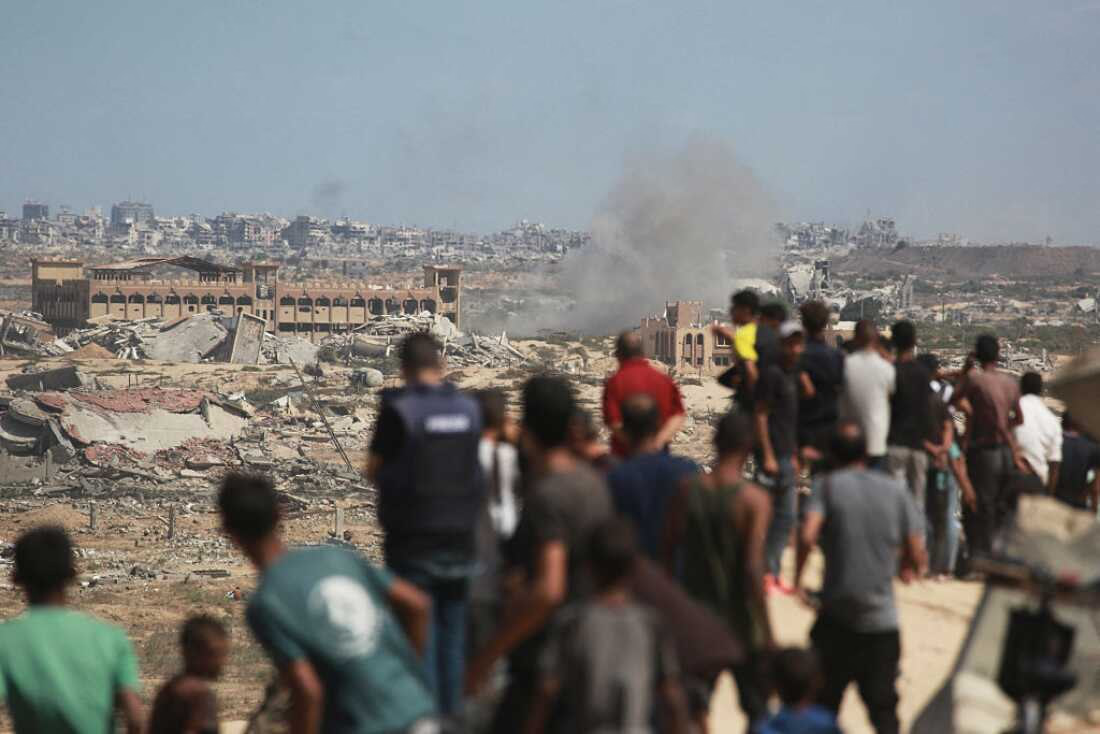
Trump sets Sunday deadline for Hamas to agree to Gaza peace plan
President Trump has given Hamas until Sunday evening to accept a U.S.-backed peace plan for Gaza, warning of severe consequences if the militant group refuses.
3 oct 2025 - 18:37 • 4 min read
President Donald Trump has issued a stern ultimatum to Hamas, demanding the militant group agree to a 20-point peace plan by Sunday evening or face a devastating military response. The deadline, set for 6 p.m. Washington D.C. time (midnight in Italy), marks a critical juncture in the nearly two-year conflict in Gaza.
Trump announced the deadline on his social media platform, Truth, stating that "all HELL, like no one has ever seen before, will break out against Hamas" if the agreement is not reached. He also urged "innocent Palestinians" to leave the areas of "potentially great future death for safer parts of Gaza," assuring they would be cared for.
The U.S.-led plan, unveiled earlier this week, calls for an immediate ceasefire, the release of all remaining Israeli hostages within 72 hours, and the return of the bodies of those believed to be dead. While Israel has reportedly agreed to the proposal, Hamas has indicated it requires more time and clarification, particularly on the timetable for Israeli withdrawal from Gaza.
A Hamas official, speaking to Al Jazeera, expressed that the group was reviewing the plan and had "comments" and "gray areas" to work with, rejecting a "take or leave it approach." Some Hamas leadership based in Qatar are reportedly open to the plan with adjustments, but lack control over the hostages, whose immediate release would diminish their primary leverage.
Trump described Hamas as a "ruthless and violent threat" that has caused immense suffering, culminating in the October 7th attacks. He claimed that over 25,000 Hamas fighters have been killed, with most of the remaining militants surrounded and trapped, awaiting his order for their elimination.
Multiple sources indicate that the Trump administration is unwilling to discuss modifications to the plan, particularly concerning the hostage release timeline, the details of Israeli Defense Forces' withdrawal, and post-war governance.
Regional powers, including Arab nations, are reportedly exerting pressure on Hamas to accept the plan, even without their full consent, and are reportedly rejecting the notion that Hamas could veto it. A Gulf official described the plan as "the best since the start of the war" and stated that "no one is willing to lose the opportunity."
Qatar, Egypt, and Turkey, which host Hamas leadership abroad, are actively engaged in mediation efforts. Concurrently, there have been unexpected political shifts within the Palestinian sphere, with Palestinian Authority President Abu Mazen reportedly reconciling with a former rival, Nasser al-Qudwa.
In a significant geopolitical development, Qatar, a key financier of Hamas and mediator in the talks, has signed multi-billion dollar trade agreements with the U.S. and will receive military protection from the United States. This shift appears to be influencing Al Jazeera, a prominent Qatari news network, which is reportedly undergoing an editorial transformation to focus more on humanitarian aspects of the enclave and less on the actions of Hamas's armed wing, a change attributed to an understanding between Qatar and the U.S. to reduce content deemed as incitement against Israel and the West.
The plan itself, reportedly drafted by Jared Kushner, Tony Blair, and Steve Witkoff, aims for an immediate end to hostilities and a gradual withdrawal of Israeli forces. It also envisions humanitarian aid and a provisional Palestinian government supervised by an international entity, potentially led by Trump himself. However, the plan does not explicitly stipulate the establishment of a future Palestinian state, a goal strongly opposed by Israeli Prime Minister Benjamin Netanyahu. The document vaguely mentions dialogue between Israelis and Palestinians for a "political horizon for a peaceful and prosperous coexistence in the future."
Hamas has also rejected the idea of an international body overseeing a transitional government, advocating for Palestinian leadership, albeit technocratic rather than political. The plan does not provide for the Palestinian Authority to govern the Strip. It also conditions potential future participation on a list of obligations, including renouncing the pursuit of international legal action against Israel.
Some reports suggest that if the agreement is not reached, Israel would be given a "carte blanche" to completely destroy Hamas fighters in Gaza. The U.S. press secretary reiterated the president's firm stance, stating that "the consequences, unfortunately are going to be very tragic" if Hamas does not accept the plan.
Amidst the diplomatic pressure, displaced Palestinians continue to face dire conditions. The United Nations has reported intense strikes in areas where civilians have been told to relocate, with tents, houses, and markets being hit, resulting in civilian casualties. Displacement sites are already hosting hundreds of thousands of people.
The deadline comes just days before the second anniversary of the conflict.